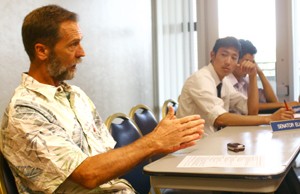More than just students spoke at Wednesday’s ASUA Senate meeting, as a member of the UA faculty shared his concerns about such issues as full classes and students frequently missing out on courses they want.
Geosciences professor George Gehrels called this situation a crisis, because students are unable to sign up for courses they need or enroll in the majors they want. He stressed that the university administration doesn’t recognize the situation they face and proposed some measures to try to free up seats for undergraduate students.
The first issue Gehrels raised was the number of seats wasted by the current Grade Replacement Opportunity policy at the UA. This allows students to retake a class for a higher grade to maintain a better grade point average. He recommended that the GRO should only be allowed for students who receive D and E grades, and to restrict GROs to a student’s first two years at the UA. This would free up 2,100 seats per semester, Gehrels said.
Sen. Nick Macchiaroli liked the idea, particularly in regard to restricting students who receive a C grade from the GRO. However, he said he believed restricting upper-division students from the policy was not fair.
Sen. Gabby Ziccarelli suggested an appeal system for students who may not be eligible for GRO once changes take effect but whose grades may have suffered due to special circumstances like illness.
Sen. Jimmy MacKenzie expressed concern about restricting C grade students from GRO due to a low grade affecting their abilities to get accepted into graduate programs such as law school or medical school. Gehrels responded that this would be open to petition.
Gehrels also raised the issue of how the prevalence of course repeats at the UA wastes what would otherwise be open seats. He stated that a small number of students at the UA have repeated courses up to 11 times. To rectify this, he recommended allowing only two attempts at each course and allowing additional repeats if seats are available on the first day of classes. This policy would generate 310 seats per year, Gehrels said.
ASUA and Gehrels also discussed “”course shopping,”” or the exchange of courses through the add/drop system, as a practice that prevents students from getting into required courses. Because five percent of seats are dropped after the last day to add, these seats get wasted. Gehrels proposed the implementation of a fee for students wanting to drop classes, as well as moving the withdrawal date to earlier in the semester and keeping WebReg open for longer.
“”Moving the (withdrawal date) closer to the beginning of classes makes me a little nervous, but at the same time, if it’s opening up more seats for students, then that’s what we want,”” said Executive Vice-President Jessica Anderson.
Macchiaroli said the university should find a way to work with teachers, faculty and departments, so that if students don’t come to class during the first week, they are automatically dropped. Gehrels replied that such a system was already in place but rarely used. Sen. Andre Rubio said a way to rectify the course shopping problem would be to have a wait list of students wanting to get into a class. Gehrels said this would be a good idea. Sen. Patrick agreed that having a wait list would be better for students.
Gehrels stated that the idea of a fee to drop classes was generally unpopular, but many senators believed it would be a good idea. Sen. Stephen Wallace supported having a charge, but stressed the need to keep it small and proposed $15 as an appropriate amount. President Tommy Bruce said other universities have successfully implemented a charge system. Sen. Emily Fritze opposed a fee, saying that with tuition costs rising, it was not the time to implement additional fees.
Sen. Bryan Baker suggested that requiring professors to have their syllabi available prior to the start of class may assist students in determining whether the course is right for them in advance to prevent course shopping.
The final issue Gehrels raised was a change in class standing to free up seats for students. He suggested that students take more credits, which would result in additional funding for the university since it receives money from increased enrollment.
“”I’m personally thrilled with the diversity of recommendations,”” Anderson said. “”It is a very real problem and a very complicated one. These are very feasible and tangible proposed solutions. The majority have a lot of possibility.””









